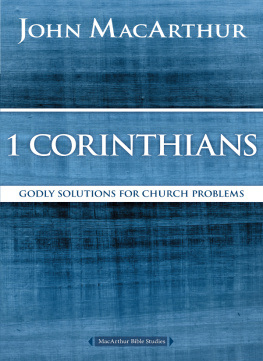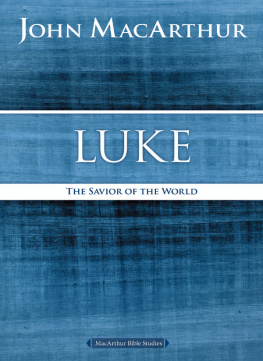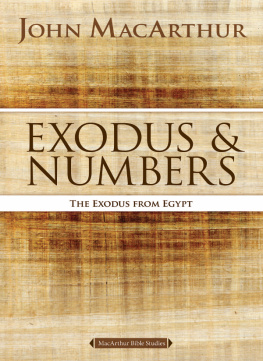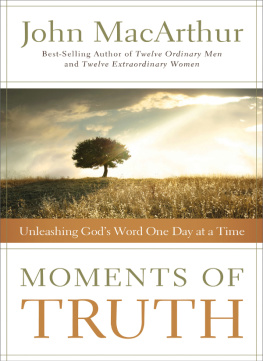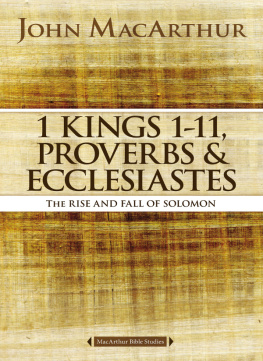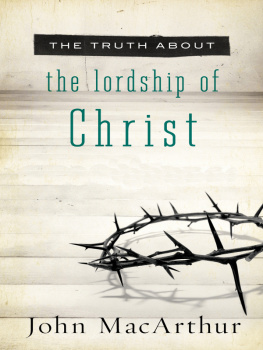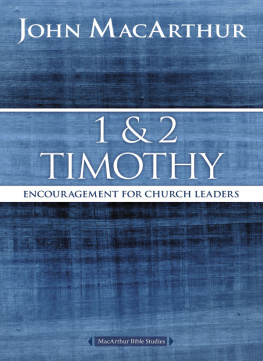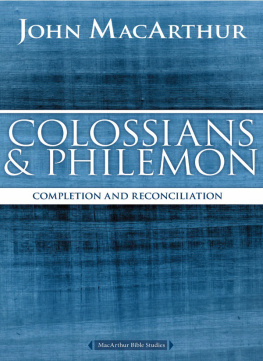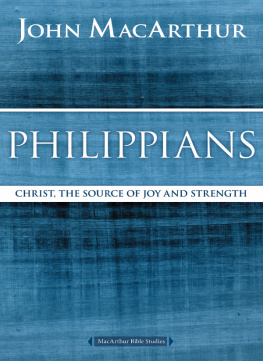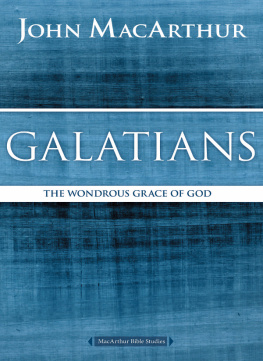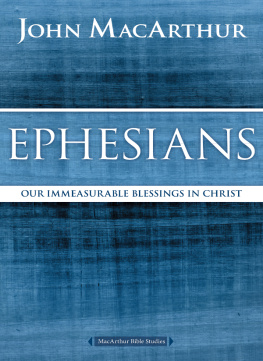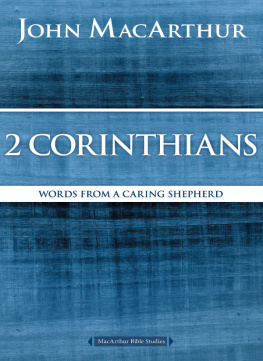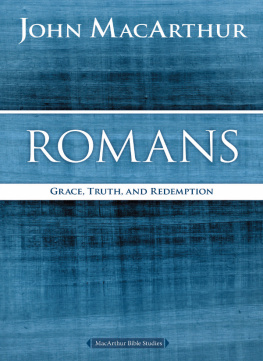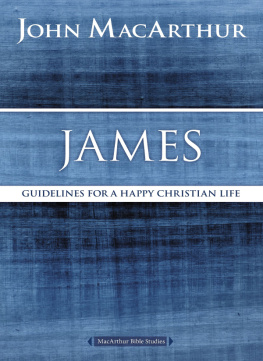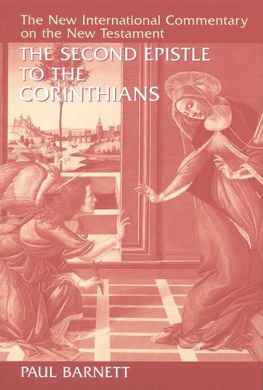1 CORINTHIANS
MACARTHUR BIBLE STUDIES
Copyright 2007 John F. MacArthur, Jr.
All rights reserved. No portion of this book may be reproduced, stored in a retrieval system, or transmitted in any form or by any meanselectronic, mechanical, photocopy, recording, or any otherexcept for brief quotations in printed reviews, without the prior permission of the publisher.
John MacArthur
Unleashing Gods Truth, One Verse at a Time
Unleashing Gods Truth, One Verse at a Time is a trademark of Grace to You. All rights reserved.
Published in Nashville, Tennessee, by Nelson Books, an imprint of Thomas Nelson. Nelson Books and Thomas Nelson are registered trademarks of HarperCollins Christian Publishing, Inc.
Nelson Books titles may be purchased in bulk for education, business, fundraising, or sales promotional use. For information, please email SpecialMarkets@ThomasNelson.com.
Published in association with the literary agency of Wolgemuth & Associates, Inc.
Produced with the assistance of the Livingstone Corporation. Project staff include Jake Barton, Betsy Todt Schmitt, and Andy Culbertson.
Project editors: Mary Horner Collins, Amber Rae, and Len Woods
Scripture quotations marked NKJV are taken from the The New King James Version.
Copyright 1982 by Thomas Nelson, Inc. Used by permission. All rights reserved.
Truth for Today material is from 1 Corinthians: MacArthur New Testament Commentary Series (Moody Press: Chicago, IL, 1996). Used by permission. All rights reserved.
Keys to the Text material taken from the following sources:
1 Corinthians: MacArthur New Testament Commentary Series. Copyright 1984, 1996 by John MacArthur. Published by Moody Press: Chicago, Illinois. Used by permission.
The MacArthur Study Bible (electronic ed.). John MacArthur, General Editor. Copyright 1997 by Word Publishing. All rights reserved. Used by permission.
Nelsons New Illustrated Bible Dictionary, Rev. ed. R. F. Youngblood, F. F. Bruce, R. K. Harrison, editors. Copyright 1995 by Thomas Nelson Publishers. Used by permission.
What Does the Bible Say About? Nelsons A to Z series. Copyright 2001 by Thomas Nelson. Used by permission.
Cover Art by Holly Sharp Design
Interior Design and Composition by Joel Bartlett, Livingstone Corporation
ISBN-13: 978-0-7180-3507-5
ISBN-13: 978-0-7180-3526-6 (eBook)
15 16 17 18 19 RRD 6 5 4 3 2 1
CONTENTS
The letter is named for the city of Corinth, where the church to whom it was written was located. With the exception of personal epistles addressed to Timothy, Titus, and Philemon, all Pauls letters bear the name of the city where the church addressed existed.
AUTHOR AND DATE
As indicated in the first verse, the epistle was written by the apostle Paul, whose authorship cannot be seriously questioned. Pauline authorship has been universally accepted by the church since the first century, when 1 Corinthians was penned. Internally, the apostle claimed to have written the epistle (1:1, 13; 3:46; 4:15; 16:21). Externally, this correspondence has been acknowledged as genuine since AD 95 by Clement of Rome, who was writing to the Corinthian church. Other early Christian leaders who authenticated Paul as author include Ignatius (about AD 110), Polycarp (about AD 135), and Tertullian (about AD 200).
This epistle was most likely written in the first half of AD 55 from Ephesus (16:89, 19) while Paul was on his third missionary journey. The apostle intended to remain at Ephesus to complete his three-year stay (Acts 20:31) until Pentecost (May/June) AD 55 (16:8). Then he hoped to winter (AD 5556) at Corinth (16:6; Acts 20:2). His departure for Corinth was anticipated even as he wrote (4:19; 11:34; 16:8).
BACKGROUND AND SETTING
The city of Corinth, located in southern Greece, is connected to the rest of Greece by a four-mile-wide isthmus, which is bounded on the east by the Saronic Gulf and on the west by the Gulf of Corinth. Corinth is near the middle of the isthmus and is prominently situated on a high plateau. For many centuries, all north-south land traffic in that area had to pass through or near this ancient city. Since travel by sea around the Peloponnesus involved a 250-mile voyage that was dangerous and time consuming, most captains carried their ships on skids or rollers across the isthmus directly past Corinth. Corinth understandably prospered as a major trade city, not only for most of Greece but for much of the Mediterranean area, including North Africa, Italy, and Asia Minor. A canal across the isthmus was begun by the emperor Nero during the first century AD but was not completed until near the end of the nineteenth century.
Like most ancient Greek cities, Corinth had an acropolis (literally a high city), which rose two thousand feet and was used both for defense and for worship. The Isthmian games, one of the two most famous athletic events of that day (the other being the Olympic games), were hosted by Corinth, causing more people-traffic. Even by the pagan standards, Corinth was known for being morally corrupt. In 6:910, Paul lists some of the specific sins for which the city was noted and which formerly had characterized many believers in the church there. Tragically, some of the worst sins were still found among church members. One of those sins, incest, was condemned even by most pagan Gentiles (5:1).
The church in Corinth was founded by Paul on his second missionary journey (Acts 18:1ff.). As usual, his ministry began in the synagogue, where he was assisted by two Jewish believers, Priscilla and Aquila, with whom he lived for a while and who were fellow tradesmen. Soon after, Silas and Timothy joined them, and Paul began preaching even more intensely in the synagogue. When most of the Jews resisted the gospel, he left the synagogue, but not before Crispus, the leader of the synagogue, his family, and many other Corinthians were converted (Acts 18:58). After ministering in Corinth for over a year and a half (Acts 18:11), Paul was brought before a Roman tribunal by some of the Jewish leaders. Because the charges were strictly religious and not civil, the proconsul, Gallio, dismissed the case. Shortly thereafter, Paul took Priscilla and Aquila with him to Ephesus. From there he returned to Israel (vv. 1822).
Unable to fully break with the culture from which it came, the church at Corinth was exceptionally factional, showing its carnality and immaturity. After the gifted Apollos had ministered in the church for some time, a group of his admirers established a clique and had little to do with the rest of the church. Another group developed that was loyal to Paul, another claimed special allegiance to Peter (Cephas), and still another to Christ alone (see 1:1013; 3:19).
The most serious problem of the Corinthian church was worldliness, an unwillingness to divorce the culture around them. Most of the believers could not consistently separate themselves from their old, selfish, immoral, and pagan ways. It became necessary for Paul to write to correct this, as well as to command the faithful Christians not only to break fellowship with the disobedient and unrepentant members, but to put those members out of the church (5:913).
Before he wrote this inspired letter, Paul had written the church other correspondence (see 5:9), which was also corrective in nature. Because a copy of that letter has never been discovered, it has been referred to as the lost epistle. There was another non-canonical letter after 1 Corinthians, usually called the severe letter (2 Cor. 2:4).
HISTORICAL AND THEOLOGICAL THEMES
Although the major thrust of this epistle is corrective of behavior rather than of doctrine, Paul explains many doctrines that directly relate to the matters of sin and righteousness. In one way or another, wrong living always stems from wrong belief. Sexual sins, for example, including divorce, are inevitably related to lack of belief or trust in Gods plan for marriage and the family (7:140). Proper worship is determined by such things as recognition of Gods holy character (3:17), the spiritual identity of the church (12:1227), and pure partaking of the Lords Supper (11:1734). It is not possible for the church to be edified faithfully and effectively unless believers understand and exercise their spiritual gifts (12:114:40). The importance of the doctrine of the resurrection, of course, cannot be overstated because if there is no resurrection of the dead, then Christ is not risen. And if Christ is not risen, then preaching is empty and so is faith (15:1314).
Next page
